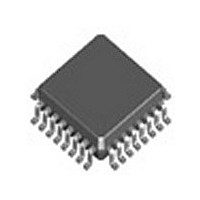DJLXT384LE.B1SE001 Intel, DJLXT384LE.B1SE001 Datasheet - Page 37

DJLXT384LE.B1SE001
Manufacturer Part Number
DJLXT384LE.B1SE001
Description
Manufacturer
Intel
Datasheet
1.DJLXT384LE.B1SE001.pdf
(140 pages)
Specifications of DJLXT384LE.B1SE001
Screening Level
Industrial
Mounting
Surface Mount
Operating Temperature (min)
-40C
Operating Temperature (max)
85C
Lead Free Status / RoHS Status
Not Compliant
- Current page: 37 of 140
- Download datasheet (2Mb)
5.5
Document Number: 248994
Revision Number: 005
Revision Date: November 28, 2005
Table 11. Clocks and Clock-Related Signals (Sheet 1 of 2)
Note: Within this table, ‘RCLK’ references RCLK7:0 and ‘TCLK’ references TCLK7:0. Each RCLK
Clocks and Clock-Related Signals
Table 11
and TCLK signal is used with corresponding signals.
CLKE
•
•
1. DI: Digital Input
Signal
Name
Example: RCLK6 is the receive clock used by RPOS6 and RNEG6.
Example: TCLK5 is the transmit clock used by TPOS5 and TNEG5.
lists and describes LXT384 Transceiver clocks and clock-related signals.
QFP
Pin
115
PBGA
Ball
E13
Signal
Type
DI
Clock Edge Select Input.
CLKE is used in clock and data recovery. When the recovery mode is
for:
Intel
• Clock recovery (see
• Data recovery (see
the CLKE pin:
• Low causes (1) both RDATA or RPOS and RNEG to be valid on
• High causes (1) both RDATA or RPOS and RNEG to be valid on
Mode”), the output polarity on both RDATA or RPOS and RNEG
is:
• Active-low when CLKE is low.
• Active-high when CLKE is high
®
the rising edge of RCLK and (2) SDO to be valid on the falling
edge of SCLK. (See
Transceiver - Transmit
the falling edge of RCLK and (2) SDO to be valid on the rising
edge of SCLK. (See
Transceiver - Transmit
LXT384 Octal T1/E1/J1 S/H PCM Transceiver with JA
CLKE
High
Low
RCLK for Valid
RCLK
RCLK
RNEG/RPOS
Section 6.3.4, “Receiver Data Recovery
Section 6.3.1, “Receiver
Signal Description
Figure 20
Figure 20
Timing”.)
Timing”.)
SCLK for Valid
in
in
SCLK
SCLK
Section 19, “Intel® LXT384
Section 19, “Intel® LXT384
SDO
Clocking”), setting
37
Related parts for DJLXT384LE.B1SE001
Image
Part Number
Description
Manufacturer
Datasheet
Request
R

Part Number:
Description:
Microprocessor: Intel Celeron M Processor 320 and Ultra Low Voltage Intel Celeron M Processor at 600MHz
Manufacturer:
Intel Corporation

Part Number:
Description:
Intel 82550 Fast Ethernet Multifunction PCI/CardBus Controller
Manufacturer:
Intel Corporation
Datasheet:

Part Number:
Description:
Intel StrataFlash memory 32 Mbit. Access speed 120 ns
Manufacturer:
Intel Corporation
Datasheet:

Part Number:
Description:
Intel StrataFlash memory 32 Mbit. Access speed 120 ns
Manufacturer:
Intel Corporation
Datasheet:

Part Number:
Description:
Intel StrataFlash memory 64 Mbit. Access speed 150 ns
Manufacturer:
Intel Corporation
Datasheet:

Part Number:
Description:
Intel StrataFlash memory 32 Mbit. Access speed 100 ns
Manufacturer:
Intel Corporation
Datasheet:

Part Number:
Description:
DA28F640J5A-1505 Volt Intel StrataFlash Memory
Manufacturer:
Intel Corporation
Datasheet:

Part Number:
Description:
5 Volt Intel StrataFlash?? Memory
Manufacturer:
Intel Corporation
Datasheet:

Part Number:
Description:
5 Volt Intel StrataFlash?? Memory
Manufacturer:
Intel Corporation

Part Number:
Description:
Intel 6300ESB I/O Controller Hub
Manufacturer:
Intel Corporation
Datasheet:

Part Number:
Description:
Intel 82801DB I/O Controller Hub (ICH4), Pb-Free SLI
Manufacturer:
Intel Corporation
Datasheet:

Part Number:
Description:
Intel 82801FB I/O Controller Hub (ICH6)
Manufacturer:
Intel Corporation
Datasheet:

Part Number:
Description:
Intel Strataflash Memory28F128J3 28F640J3 28F320J3
Manufacturer:
Intel Corporation
Datasheet:











